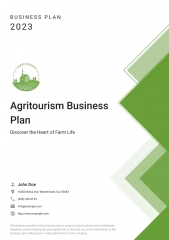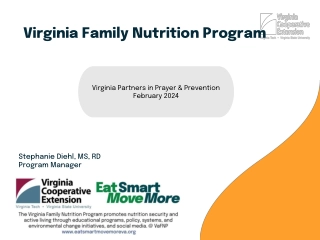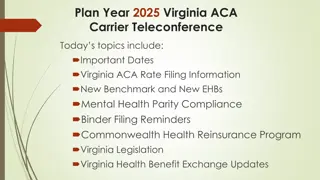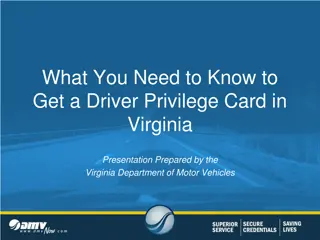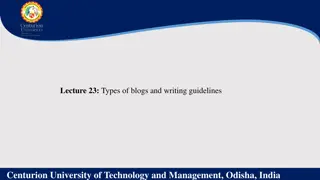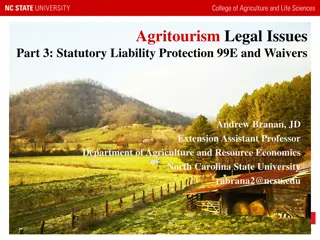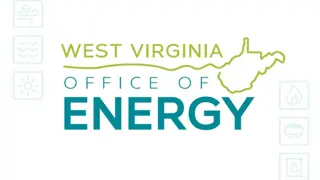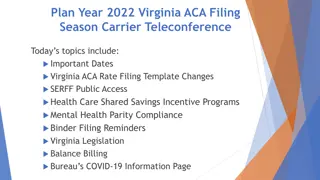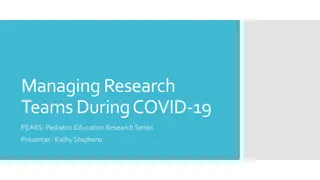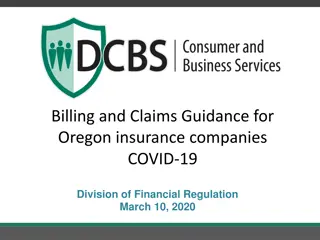Guidelines for Agritourism Businesses During COVID-19 in Virginia
Guidelines and resources for agritourism businesses in Virginia during COVID-19 are provided by the Virginia Department of Agriculture and Consumer Services. The information includes staying informed, phase three guidelines, staying connected with relevant organizations, and detailed guidance for businesses in various sectors. Recommendations cover physical distancing, cleaning practices, workplace safety, social gatherings, restaurants, and more. Stay updated on the latest information to ensure the safety of employees and visitors.
Download Presentation

Please find below an Image/Link to download the presentation.
The content on the website is provided AS IS for your information and personal use only. It may not be sold, licensed, or shared on other websites without obtaining consent from the author. Download presentation by click this link. If you encounter any issues during the download, it is possible that the publisher has removed the file from their server.
E N D
Presentation Transcript
Agritourism Agritourism and COVID 19 and COVID 19 Virginia Department of Agriculture and Consumer Services 102 Governor Street | Richmond, VA | 23225 1
Stay Informed: https://www.virginia.gov/coronavirus/ Forward Virginia Phase Three Guidelines Printable Posters Frequently Asked Questions
Stay Informed: www.vdacs.virginia.gov
Stay Connected: Virginia Department of Agriculture Food and Produce Safety Office of Promotions Virginia Grown Virginia Finest Office of Domestic Marketing Regional Staff Agriculture and Forestry Development (AFID Grant) Virginia Cooperative Extension State and local staff Virginia Tourism Local Office Destination Marketing Office Department of Health State and Local Local Department of Economic Development Virginia Agribusiness Council Virginia Small Business Development Centers Take advantage of all the virtual learning being offered both statewide and nationally.
Phase 3 Guidance: SAFER AT HOME: PHASE THREE GUIDELINES FOR ALL BUSINESS SECTORS https://www.governor.virginia.gov/media/governorvirginiagov/governor-of- virginia/pdf/Forward-Virginia-Phase-Three-Guidelines.pdf Save this link and refer to it often Changes can occur during the Phase
Phase 3 Guidelines: SAFER AT HOME: PHASE THREE GUIDELINES FOR ALL BUSINESS SECTORS https://www.governor.virginia.gov/media/governorvirginiagov/governor-of-virginia/pdf/Forward- Virginia-Phase-Three-Guidelines.pdf Includes Guidelines for: Physical Distancing Best Practices Enhanced Cleaning and Disinfecting Best Practices Enhanced Workplace Safety Best Practices Guidelines for Social Gatherings, Restaurants and Beverage Services, Farmers Markets, Brick and Mortar Retail, Fitness and Exercise Facilities, Swimming Pools, Recreational Sports, Personal Care and Grooming Services, Campgrounds and Overnight Summer Camps, Entertainment and Public Amusement, Religious Services, and Horse and Other Livestock Shows, Horse Racing Racetracks: Multi-day Events, and Outdoor Speedways Includes links to printables for use at your business
Phase 3 Guidelines: SAFER AT HOME: PHASE THREE GUIDELINES FOR ALL BUSINESS SECTORS https://www.governor.virginia.gov/media/governorvirginiagov/governor-of-virginia/pdf/Forward- Virginia-Phase-Three-Guidelines.pdf Establish policies and practices for maintaining appropriate physical distance between persons not living in the same household. Provide clear communication and signage for physical distancing in areas where individuals may congregate, especially at entrances, in seating areas, and in check-out lines. Limit the occupancy of physical spaces to ensure that adequate physical distancing may be maintained. (See sector-specific guidelines for more detailed information.) Practice routine cleaning and disinfection of high contact areas and hard surfaces, including check out stations and payment pads, store entrance push/pull pads, door knobs/handles, dining tables/chairs, light switches, handrails, restrooms, floors, and equipment.
Phase 3 Guidelines: SAFER AT HOME: PHASE THREE GUIDELINES FOR ALL BUSINESS SECTORS https://www.governor.virginia.gov/media/governorvirginiagov/governor-of-virginia/pdf/Forward- Virginia-Phase-Three-Guidelines.pdf To the extent tools or equipment must be shared, provide access to and instruct workers to use an EPA- approved disinfectant to clean items before and after use. Provide a place for employees and customers to wash hands with soap and water, or provide alcohol- based hand sanitizers containing at least 60% alcohol. When developing staff schedules, implement additional short breaks to increase the frequency with which staff can wash hands with soap and water. Alternatively, consider providing alcohol-based hand sanitizers with at least 60% alcohol so that workers can frequently sanitize their hands. This did not include all of the guidelines included in Phase 3 but instead a high level look at some of the guidelines included in the All Business Sector section. Please review the entire document at the above listed website to view all the guidelines.
Going Forward: Review the Phase 3 Guidelines and understand how they apply to your farm/business Will you need to change the way the business operates? Will you need to restrict access to parts of the farm or some activities previously offered? Will you need additional staff, technology or equipment? What are the costs associated with any changes? Assess the risk Your farm Your family Your staff Your business
Going Forward: Consult with your insurance agent/legal advisor Consult with your local health department Talk to other businesses In your locality Around the state With a similar business model Consider partnerships Ask questions
Things to Consider: Stay informed of executive orders and guidelines issued by the Governor to reduce COVID-19 transmission Clearly communicate farm rules and visitor expectations prior to arrival and during farm visits through website and social media posts, promotional materials, staff instruction, and farm signage Train employees on all personal and farm safety protocols developed to minimize risks of COVID-19 transmission Document all training, safety protocols and cleaning protocols being taken on the farm what is being done and how often Organize agritourism activities and manage visitor flows to maintain adequate social distancing on the farm Evaluate farm capacity (include capacity for individual attractions) Identify areas of possible high pedestrian volume (parking areas, sales areas, entrances and exits) Take measures to reduce potential pedestrian bottlenecks , large congregation areas and cross-flow contact
Things to Consider: Provide adequate and appropriately stocked/maintained hand washing and hand sanitizer stations in key areas Establish regular cleaning and disinfection procedures for frequently touched surfaces or objects Construct physical barriers, if needed, to reduce potential contacts between staff and visitors (e.g., Plexiglass partitions in sales areas) Explore options for pre-registration to control visitor volumes and pre- payment or touchless payment options to reduce contact between staff and visitors Explore options for by-appointment visits to your farm Discourage unnecessary customer handling of farm products prior to purchase Ensure that all farm staff avoid coming to work if they are symptomatic, have tested positive for the virus, or have been in close contact with anyone who has tested positive for COVID-19
Travel Surveys: Sixty-seven percent of travelers are likely to travel by personal car during the next six months (MMGY Travel Intelligence Survey June 15, 2020) Travelers more willing to take regional trips Travelers feel safer in their own cars Travelers find non-team outdoor recreation and road trips the most safe options Good News for Agritourism
Note of Caution: Some localities are hesitant to invite travelers into the community Residents have concerns You will need to work with local officials and build support Demonstrate safety precautions being taken Show how you drive the local economy In 2015 visitors to Virginia s agritourism farm businesses spent an estimated $1.5B throughout the state. Approximately, 17% of this total was spent at the agritourism venues; the remaining 83% was spent outside the venues (e.g. hotels, restaurants), but inside the Commonwealth. (https://www.vatc.org/wp-content/uploads/2020/01/The-Economic-and-Fiscal-Impacts-of-Agritourism-In-Virginia.pdf)
Reimagine: Pick-your-own by appointment Helps ensure your not overwhelmed by visitors Virtual appointment to select your Christmas Tree Curbside Delivery to locations throughout community or residences Private shopping or visiting by appointment Online orders Virtual Sessions Gardening tips Life on the farm Cooking lessons
Consider Partnerships: With a local winery/cidery With a local farmer offering a CSA With a local art studio With a local school or PTO/PTA With a local chef With a local farmers market Many offer holiday markets Many are open year-round Be creative consider how your customer is using your product and how you can deliver it in a new way
Rethink Your Marketing: Your website and social media are extremely important communication tools Make sure your days and hours of operation are accurate Keep visitors up-to-date on new farm policies and requirements due to COVID Set the expectations for their visit Let them know what you are doing to prevent the spread of the virus Engage your customers with life on the farm and your business Stay active on social media and your website
Heather Wheeler Program Manager, Virginia Grown heather.wheeler@vdacs.virginia.gov 804-786-5842 www.VirginiaGrown.com


